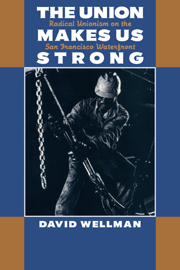Book contents
- Frontmatter
- Contents
- Preface
- Notes on unpublished sources
- PART I LABOR RADICALISM REVISITED
- PART II LOCAL COMMUNITY AND “TUMULTUOUS” DEMOCRACY: THE SOCIOCULTURAL FOUNDATIONS OF UNIONISM ON THE SAN FRANCISCO WATERFRONT
- PART III UNIONISM, WORK, AND TECHNOLOGICAL CHANGE
- PART IV WAGING THE BATTLE FOR WORKPLACE CONTROL ON CONTRACTUAL TERRAIN
- PART V AGREEING TO DISAGREE: BEING DEFENSIBLY DISOBEDIENT
- Conclusion: Trade union exceptionalism or prefigurative politics?
- Appendix: Doing field research: An ethnographic account
- References
- Name index
- Subject index
PART IV - WAGING THE BATTLE FOR WORKPLACE CONTROL ON CONTRACTUAL TERRAIN
Published online by Cambridge University Press: 11 November 2009
- Frontmatter
- Contents
- Preface
- Notes on unpublished sources
- PART I LABOR RADICALISM REVISITED
- PART II LOCAL COMMUNITY AND “TUMULTUOUS” DEMOCRACY: THE SOCIOCULTURAL FOUNDATIONS OF UNIONISM ON THE SAN FRANCISCO WATERFRONT
- PART III UNIONISM, WORK, AND TECHNOLOGICAL CHANGE
- PART IV WAGING THE BATTLE FOR WORKPLACE CONTROL ON CONTRACTUAL TERRAIN
- PART V AGREEING TO DISAGREE: BEING DEFENSIBLY DISOBEDIENT
- Conclusion: Trade union exceptionalism or prefigurative politics?
- Appendix: Doing field research: An ethnographic account
- References
- Name index
- Subject index
Summary
IT could be argued that longshoremen's objections to the language of command, their active defense of personhood and integrity, their willingness to impose codes of conduct and enforce standards for accountability are examples of radicalism driven underground. Like wildcat strikes and other sorts of insubordination, they could be considered versions of phantom unionism, “weapons of the weak” in James Scott's terms (1985, 1990). Although they are potential sources of power, it could be said, they do not amount to actual institutional or organizational power. Thus, these acts of resistance would not undermine the theories of labor's demise. Longshoremen, it might be argued, like other American workers, are unable to challenge management's authority contractually, and in this respect, the issue of shopfloor regime has been essentially settled. Like other American unions, it might be said, the IIWU has signed agreements with employers that formally grant management control over the work process. The battle for workplace control has, therefore, for all intents and purposes, ended; and, in the strict sense of the term, class conflict has been replaced by various forms of class cooperation.
The M&M Agreements could be read to confirm this view. They apparently did to the IIWU in the 1960s what earlier contracts had done to the CIO in the late 1930s. The agreements undermined longshoremen's ability to effectively dispute management's rule on the docks. According to the terms of the M&Ms, the IEWU agreed to eliminate restrictive work rules and permit employers to introduce more efficient work practices.
- Type
- Chapter
- Information
- The Union Makes Us StrongRadical Unionism on the San Francisco Waterfront, pp. 201 - 204Publisher: Cambridge University PressPrint publication year: 1995



